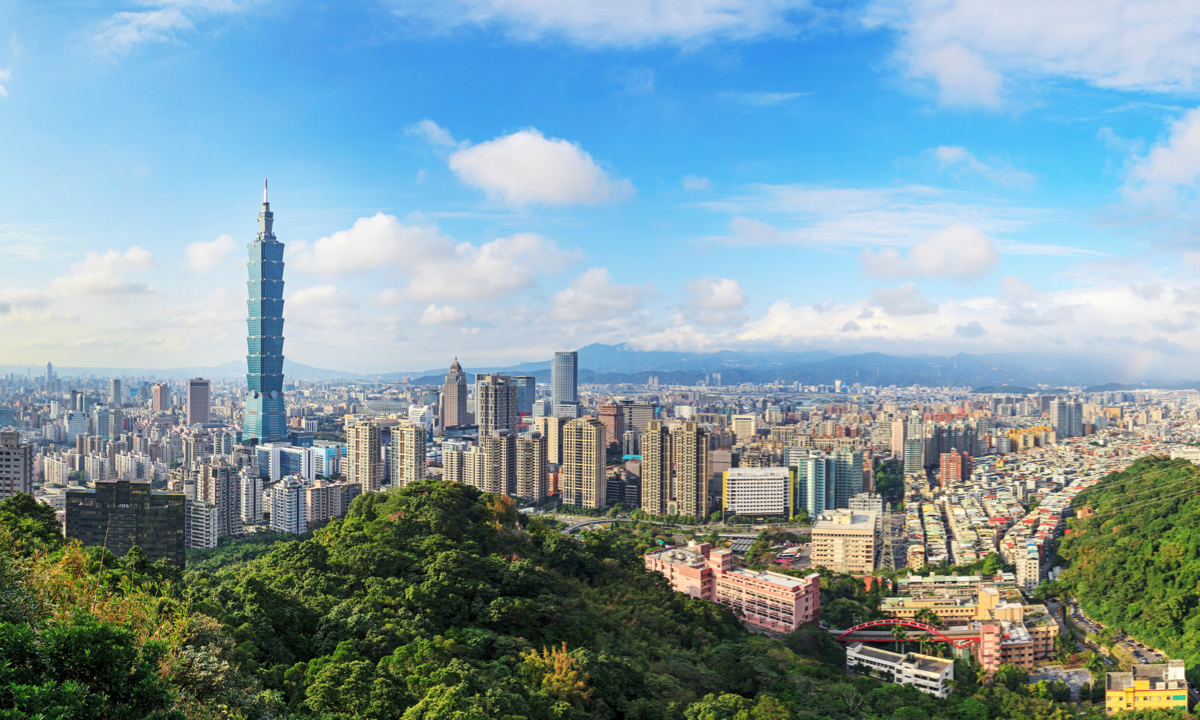Peace, prosperity and dignity: reunification brings tangible benefits to Taiwan residents

Photo: VCG
Editor’s Note:The 2023 Global Times Annual Conference themed on "China and the World after the 20th CPC National Congress" was held in Beijing on Saturday. To understand the importance of China's stability to the changing world and explore what China should do to better grasp opportunities amid challenges in 2023, the Conference focused on four topics including China-US coexistence, cross-Straits reunification, Russia-Ukraine conflict and prospects of China's economy. The following contains the excerpts of participating experts' views on what benefits cross-Straits reunification will bring about to Taiwan residents.
Wang Zaixi, former deputy director of the Association for Relations Across the Taiwan Straits of the State Council and vice president of National Society of Taiwan Studies
There are several advantages for the people of Taiwan island after they reunify with the mainland. The first and the major one is that the island can gain long-term peace and stability. Although the way that various Taiwan regional leaders dealt with cross-Straits relations has been different, the two sides were basically in a hostile state. But if reunification is achieved, the nature of cross-Straits ties will change fundamentally. Taiwan island can become a special administrative region of China, and the political divergences between the two sides can be solved once and for all.
After reunification, the actual arms race that has existed long between the two sides will be ceased. Taiwan’s military expenditure can instead be used to improve people’s livelihoods. Meanwhile, room for economic development will expand, as the economic and trade ties between the mainland and Taiwan will become closer. Taiwan’s trade with the mainland will be given more preferential treatment than the current Economic Cooperation Framework Agreement offers.
Besides, after reunification, Taiwan need not spend a great deal of money to expand its so-called international space. In the international community, people of Taiwan island can share the dignity of China as a global major power together with their mainland compatriots.
Zhao Xiaozhuo, deputy director of the Beijing Xiangshan Forum Secretariat
If the mainland and Taiwan are not reunited, it will become an increasingly heavy burden for the two sides. The US is exploiting this. The US has always treated Taiwan as a “political entity.” It claims that it does not support Taiwan “independence,” which is not the case. The US works only for its own interests, not Taiwan’s.
The US has no Taiwan policy, but only a China policy. Its maneuvers around Taiwan question all serve its China policy. It will abandon Taiwan whenever such is needed. It appears that the US is attaching more importance to Taiwan, only because it views the mainland as its strategic rival. The US plays Taiwan as a card because it is the card that can trigger the Chinese people’s strongest emotions.
The US fans the flames, but it will only add fuel to the fire instead of rescuing them. The only victim in the end will be Taiwan. This year’s Ukraine crisis has made the world see that the US will not get involved in a conflict, and it is Ukraine that has been reduced to debris. Is Taiwan willing to become so?
Zhou Zhihuai, deputy director of the Study and Research Committee at the China Council for the Promotion of Peaceful National Reunification
National reunification is not like buying vegetables at a farmers' market where you can randomly bargain. It is not that we do not reunite if there is no benefit. We should ask, what benefits could reunification bring to the mainland people? If there are no tangible benefits, should mainland people give up the idea of reunification? Of course not.
Reunification will bring benefits to the Taiwan people, and this will be a progressive, lasting and dynamic process. Taiwan’s future lies in national reunification, and the welfare of Taiwan compatriots lies in national rejuvenation.
Wu Yongping, dean of the Institute of Taiwan Studies from Tsinghua University
Besides tangible material interests, reunification can bring important psychological benefits, that is Taiwan will forever end its psychological mess due to having a misplaced national identity.
For the past 100 years, Taiwan has been wondering about its own identity. After it was colonized by Japan in 1895, it was confused about being Chinese or Japanese. After Taiwan’s return to China in 1945, due to the civil war and Taiwan’s internal governance, there was confrontation across the Straits. After reunification, Taiwan compatriots will be able to identify themselves as Chinese and enjoy the glory of the rejuvenation of the Chinese nation.
But this will be a long process. There are forces on the island who are mentally controlling the Taiwan people, and we need to free them from such spiritual blockade.
Chiu Yi, professor of Chinese Culture University
Taiwan’s defense budget for next year is NT$580 billion (US$ 18.3 billion), a historic high. In addition, Taiwan needs to cater to the unlimited demands of a small number of countries to sustain their “recognition” of Taiwan’s “sovereignty” internationally. Putting these all together, Taiwan’s wasted expenditures every year are quite high. Once reunification is achieved, this wasted expenditure will no longer be needed, which will bring tangible dividends for Taiwan.
Reunification can also help revive the stagnant economy of Taiwan island. It will bring many development opportunities to Taiwan’s young people, solve the problem of unemployment and low wages, and give them hope and promising future.
Taiwan’s competitiveness has declined in recent years as resources are increasingly exhausted by internal frictions. Some people in Taiwan now say there is no “international space” for Taiwan. I think we should tell Taiwan residents that after reunification, Taiwan will have more international space, just as Hong Kong does.
Cheng Po-yu, executive director of the cross-Straits Youth Exchange Association
Previously, I brought the white paper “The Taiwan Question and China's Reunification in the New Era” to the Taiwan island, unfortunately, many people in Taiwan island didn’t know about it at all, largely because of the isolated media on the island. Taiwan regional leader Tsai Ing-wen keeps using fancy words to make people on the island live in an illusion. To change the situation, I think positive expressions are important. If there is no discussion on the benefits of reunification within Taiwan, it will become a situation that the two sides of the Straits will only talk to themselves.
I have been living in the mainland for seven years. When I returned to Taiwan, I told people there the good situation of the mainland I saw and my entrepreneurship experience in the mainland. I think it’s the best way for them to understand the mainland properly. For the Taiwan residents, benefits at the macro level are intangible, untouchable and unperceivable. I think the most important is to make them feel the tangible benefits at the micro level.
Huang Jing, a distinguished professor from Shanghai International Studies University
I think Taiwan residents need to see clearly that if the status-quo of the cross-Straits situation continues without reunification, the path for Taiwan residents ahead will be narrower, the state of Taiwan being treated as a strategic chess piece by the US will not change, meaning the US will continue to take advantage of Taiwan island. That approach will inevitably touch the core interests of the mainland, and the mainland is bound to take growing countermeasures.
The case of Taiwan Semiconductor Manufacturing Co (TSMC)'s decision to invest in cutting-edge technology in the US is an example of the US' crackdown on China, which has diminished Taiwan's economic guarantee. The semiconductor industry, an economic pillar of the island, is about to be hollowed out by the US. If national reunification cannot be achieved, Taiwan would not only lack security guarantees, economically speaking, but will also lose its international dignity and make the island people think they are an "international orphan." The island’s residents will be immersed in a state of division, socially and culturally, even psychologically. People in Taiwan will ask who am I after growing up. If these issues cannot be solved, there will be no tranquil life on the island.
Taiwan has now reached a critical moment to make a decision. The "Taiwan independence" forces have led Taiwan onto a path of destruction. After reunification, security will be guaranteed, international dignity will be gained, and there will be more room for economic development. Taiwan residents’ confidence, social unity and cohesion will also be restored. This is obvious. I think cross-Straits reunification is imperative.

